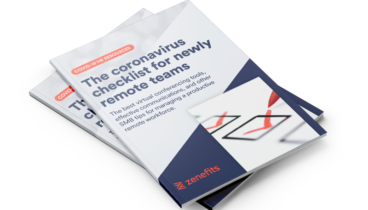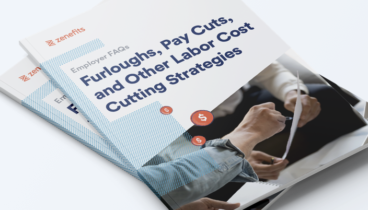Your employees may be receiving unemployment benefits and feeling conflicted about returning to work. How do you motivate them to come back?

Here's what you need to know:
-
Businesses are struggling to entice some workers back to the job at a lower rate of pay compared to unemployment
-
You can offer workers transitional, part-time hours until federal UI benefits expire
-
It's also important to remember that in most states, if an employer offers an employee their job back but they refuse, they then lose their UI eligibility
As businesses begin to reopen, many owners are concerned their employees will not return to work. Whether it’s the appeal of unemployment benefits that may have exceeded normal salaries, fear of COVID-19, or other factors, they may be right to be worried.
While the Paycheck Protection Program clause of the Coronavirus Aid, Relief, and Economic Security Act was meant to help businesses stay financially afloat during shutdowns, it has created unintended consequences. The additional $600 per week provided by the federal government, on top of more lenient state unemployment benefits, has put workers at odds with employers.
Analysis from The New York Times revealed that in over 30 states, on average, workers are receiving more compensation on unemployment than they would get on the job. The additional funds, meant to help workers, are hurting workplaces in the process.
As part of the PPP, the SBA-backed loans that were intended to cover payroll for 24 weeks total have left many businesses are struggling to use the money to entice workers back to the job at a lower rate of pay compared to unemployment.
When it’s time to start recalling workers, be ready for obstacles. Remind employees there are other things to consider to motivate them to return.
Unemployment is at an all-time high
The additional $600 per week provided by the federal government, on top of more lenient state unemployment benefits, has put workers at odds with employers.
The nation is seeing unprecedented levels of unemployment for every category of work. While some retailers are essential and have stayed open, others had to shutter. This has caused a surge in unemployed workers looking for a job, particularly those who for minimum wage.
For many, the opportunity to find work will be well within their grasp if there are employees who refuse to return to work. Your preference may be to reinstate existing employees who know the work, the company, and the routines. If you must hire new staff and train, this is the time to find people ready to work. For staff members who are waffling about whether or not they should come back, remind them you have work to perform and you may have to hire outside help in their place.
There’s transitional work until UI benefits run dry
Many SMBs are in a quandary — they know their employees are earning more on unemployment insurance. For some, offering transitional, part-time hours until federal UI benefits expire on July 25 can help bridge the gap.
Staffers who are returning part-time will lower their portion of UI benefits, but the additional $600 provided by the federal government will stay in place. This offers staffers the best of both worlds — the extra money continues to come in through the end of July even as they transition back to full-time work.
Returning to work has health benefits
For many workers the loss of job, even temporarily, meant the loss of health benefits. While some employees were furloughed and/or their benefits remained intact, the majority of American workers saw a negative impact to the healthcare coverage their companies could afford to provide during the shutdown.
Getting back on the job and on the payroll means benefits are reinstated. If employees were forced to use COBRA to keep their healthcare benefits continuing, the cost may have been steep.
For others, COBRA pricing put extending benefits throughout the shutdown out of reach. Returning to work means reinstating those coverages at employee rates – typically with the employer providing some assistance with cost.
In addition to medical coverage, getting back on the payroll could mean reinstating dental, vision , and wellness benefits, including mental health. After a long stretch of professional uncertainty, and all its accompanying stress, these benefits could be critical for workers to get back up to speed and back to routines.
Having structure in our lives is healthy physically: knowing you have comprehensive healthcare coverage if your health is impacted reduces stress. That can lead to better overall health, as well. Healthcare coverage, for individuals or whole families, is an important benefit businesses provide. Getting back to full coverage is an excellent reason to return to work.
Unemployment is finite
Finally, if the carrots don’t work, perhaps the stick will. In most states, if an employer offers an employee their job back but they refuse, they then lose their UI eligibility. There are exceptions to refusing work during the pandemic — having or having to care for someone who has the virus, or the inability to find caregivers for children who cannot go to school or daycare. For these workers, extended leave is required by law.
For any others who refuse to return to work, you have the right as an employer to notify your state unemployment compensation office of their refusal. They may lose their benefits if a valid outbreak exception doesn’t support their refusal. It may seem harsh, but remember UI benefits are not free. Employers can expect their UI rates to jump significantly next year, following the high levels of experience during the outbreak. If state coffers are drained, expect additional fees and charges to be added on.
When employees are eligible for unemployment compensation, it’s their right to receive it and your responsibility as an employer to assure they do so. When they are not entitled, no matter how much you feel for their individual situation, they should not collect. UI may seem like an unlimited resource, but like everything else, eventually there is a price to pay.
Small businesses are feeling the pressure to return to work and start generating revenue as soon as possible. Unfortunately fallout from COVID-19, and state and federal UI programs are making it more challenging to do so. You may have to be creative to entice staffers to return to work, but in the long run it will be worth it for everyone.




